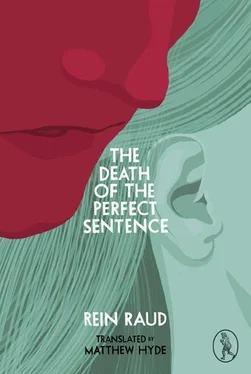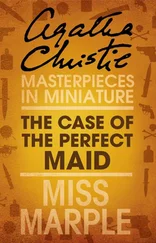As for Karl, he had a pretty decent collection of sports-themed stamps. Nothing exceptional, but all the same.
“You shouldn’t let them beat him up like that, Comrade Major,” said Särg. “It doesn’t produce any results.”
“I make the decisions around here,” Vinkel snorted. He actually agreed, but that didn’t mean he would let his subordinates tell him what to do. What’s more he was hungry, and his bosses had demanded a report from him, but he didn’t have any good news for them.
“In that case I ask for your permission to return to the sixth department,” Särg requested. “I’ve got a lot of work on with my own cases anyway, and it’s looking pretty clear by now that this case doesn’t have anything to do with economic crime.”
“Expressing our views, are we Comrade Captain?” Vinkel said with a wink. “You can actually be quite sure that you’ll soon be very interested in this particular case.”
Särg didn’t understand what was meant by that. Unlike us, dear reader, because we have reason to suspect that this Anton – the one who didn’t return to the cellar from the picket with the others but went straight home – and Captain Särg’s son, the history buff and self-proclaimed true Estonian, are one and the same person. And from that it is easy to draw conclusions about the company which Anton Särg kept and who his friends were, and then to conjecture that it was very probable Anton Särg would eventually end up in one of the pictures taken by those plain-clothed policemen with their long-focus lenses as they sat and observed the insurrectionary youth.
Anton could not shake the fear that he would never be fully accepted as one of the gang, even when they started giving him tasks which involved a high level of responsibility. He was terribly ashamed of his slight Russian accent and occasional slip-ups with the partitive plural, even if all the rest of them were completely used to it and took it as nothing more than a personal quirk. It never occurred to anyone to call him a bloody Russky.
But this is how it had happened:
The history teacher, Comrade Kovalyova, had been ill the day when she was supposed to teach an extra lesson on the subject of the Molotov-Ribbentrop Pact and explain that the information spread by Western propaganda radio stations regarding some sort of secret protocol hadn’t been corroborated; Soviet historians had searched the archives for the document, but since it did not exist, it could not be found. Moreover, at the moment when Nazi Germany and the Soviet Union signed the non-aggression treaty it had been a necessary step, giving the leadership breathing room to prepare for the test of strength which was soon to ensue. And it was highly regrettable that so many people had allowed themselves to be misled, organising the so-called Baltic Chain and demanding the abrogation of something which didn’t even exist in the first place.
It was that cold, dark time of year, teacher Kovalyova was already getting on in years, and she was not in the best of health, so there was nothing surprising about her falling ill. But that lesson couldn’t just be cancelled: the order had come from above and it had to be executed.
So teacher Kovalyova had to give that lesson a week later, on the day on which Estonians celebrated Christmas.
The extra history class took place straight after the other lessons were finished. Teacher Kovalyova had been in front of a class of students since morning and was already really tired, but as far as she was concerned she managed to deliver her text pretty enthusiastically and convincingly.
“Are there any questions?” she asked. “Would anyone like any points clarified?”
One hand went up. It was Class 9b’s top student, Anton Särg.
“Go on, Anton,” said teacher Kovalyova.
“There is one thing I would like clarifying,” said Anton, standing up. “If it is really true, as you say, that this additional protocol never existed, then why is it that the Soviet Congress of People’s Deputies declared it null and void today, with effect from the moment it was signed.”
Deportations.
A war of independence – not the Civil War.
Mass murder in Tartu’s prisons.
And of course the Gulag.
Now try saying something without lying for a change. Or just fuck off.
Maarja and Raim were on the third floor of the Pegasus café. It was nice and quiet here during the day, just the odd hung-over poet coming up the stairs to check if there was anyone he knew, but there wasn’t. On a hot day like this it would have made more sense to be outside, Maarja thought. Looking out of the large windows towards the other side of the street, at the mounds outside Niguliste church, she could see ten or so smallish groups who had taken a seat, each with a plastic bag of goodies. But it was definitely more private here inside, that was true.
Maarja had been unsure until the very last moment whether she would return to the picket. She couldn’t even say why she had put money into the collection jar. Naturally she wanted the same things as everyone else: she’d taken part in the unofficial singing nights and signed up for the Estonian Citizens’ Committee long ago, and during the congress of the Popular Front she had sat with her parents, glued to the radio from morning to evening. But she had yet to decide for herself whether it was a good thing that there were so many of those activists groups. On the one hand it could mean that one of them was bound to get lucky. But it could also mean that they would blow so much hot air fighting amongst themselves that the important things would simply be forgotten. So it was a little strange to find herself sitting there drinking cheap red wine with this guy who didn’t have any doubts of that kind.
Otherwise, though, he was quite all right, even very much so. And he radiated some kind of power, some sort of certainty, so you were sure right away that you could rely on him, that he knew how things were. Not that Maarja found him attractive as such: despite all their inner confidence those blond, broad-shouldered types were a bit ordinary – not stupid or anything, ordinary in the right way, just like straight-talking and clean water. Transparent, yes, that was the right word. Not that he didn’t have any secrets, everyone had them, just that those secrets were somehow clear.
It is true that it’s impossible to live without clean water, but clean water is not enough on its own.
In any case it was pretty cool to be drinking wine with him. Anyway the other girls were either at work, in the countryside, or elsewhere.
“May you live in interesting times”
In 1936, shortly before Sir Hughe Montgomery Knatchbull-Hugessen departed on a diplomatic mission to China, one of his friends told him about a Chinese curse he had once heard: “May you live in interesting times!” Or at least that is what Knatchbull-Hugessen claims in his memoires. There are some other British authors who appear to have known of such an expression too. The Chinese, however, do not. The closest thing in meaning which they have is the following: “It is better to live as a dog in peaceful times than as a human in a world of confusion.”
And what about it?
Just like anyone else, I have done things in my life which I am not proud of, and even one or two things which I regret. But I have no reason to be anything other than happy that I have lived in the period when I have, and that I have been able to experience one world changing into another. So what if this has stirred hungers in me which have damaged me? I am willing to pay that price, if only for the perspective it gave me, which is something I do not encounter in people who have lived under only one political order.
Читать дальше












